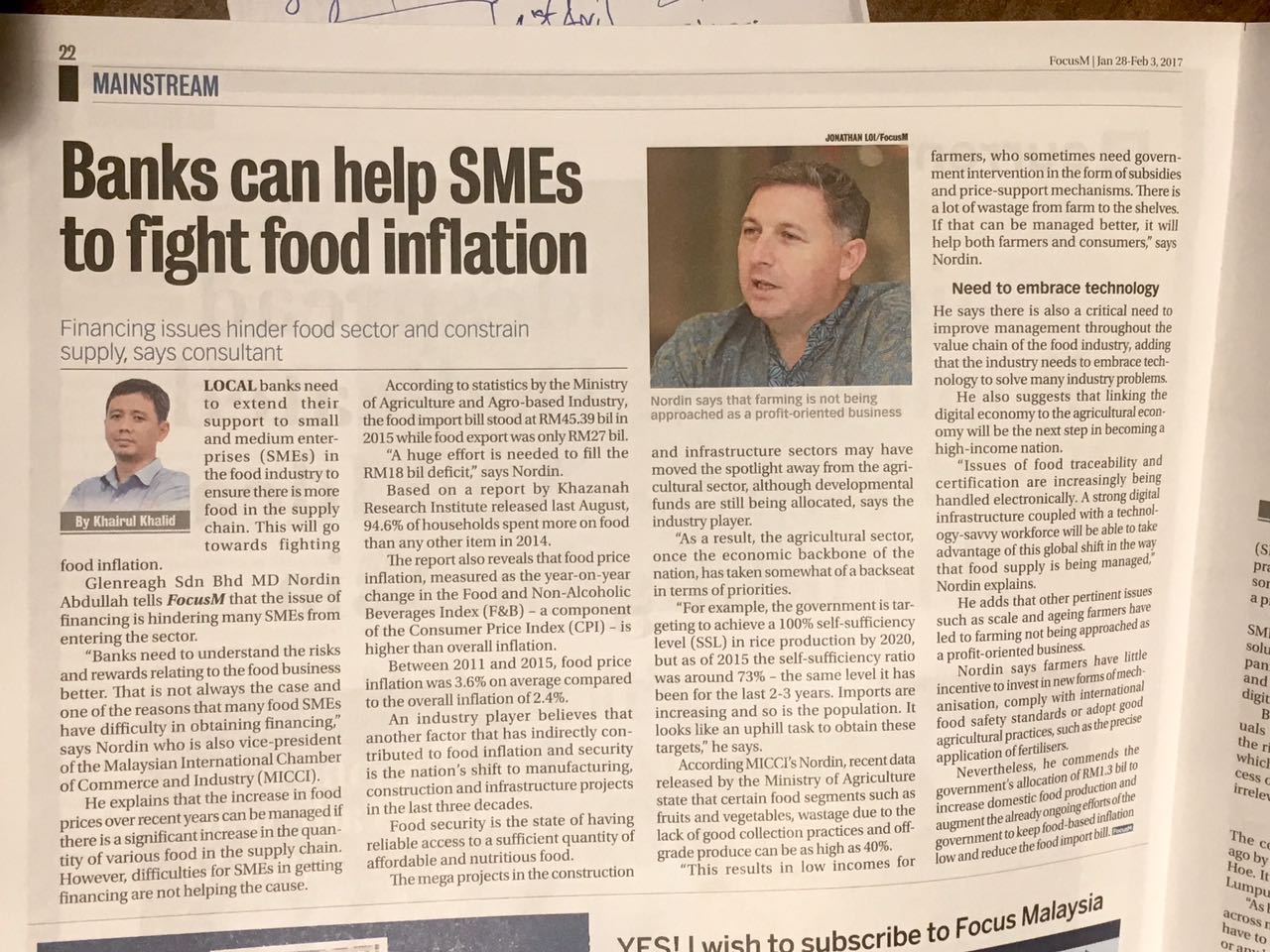The Malaysia Global Business Forum will organize a series of food security event in conjunction with its food security initiative.
To get more information about the upcoming events please contact us today.
Upcoming Events :
- Launch of MGBF Food Security Initiative
- Stakeholder 1st Roundtable
- Stakeholder 2nd Roundtable
- Stakeholder 3rd Roundtable
- Conference
Food Security Malaysia Looking forward to 2017 – Commentary
Attribute this statement to:
Nordin Abdullah
Managing Director,
Glenreagh Sdn. Bhd.
The recent tabling of the 2017 budget themed “Budget 2017: Ensuring Unity and Economic Growth, Inclusive Prudent Spending, Wellbeing of the Rakyat”, the budget allocation of some RM260.8 Billion has balanced the immediate concerns of the people and the long term strategic goals of sustainable economic growth for the country.
Key indicators of economic growth such as improved purchasing power, continued domestic demand and consistent external trade figures builds confidence in Malaysia’s economy. Coupled with the government’s ability to continue to invest into infrastructure projects and social wellbeing programs, more importantly Malaysia continues to enjoy an A- credit rating.
The allocation of RM1.3 billion to increase domestic food production is an important to augment the already ongoing efforts of the government to keep food based inflation low and to reduce the food import bill. Continual investment into agriculture infrastructure such as drainage and irrigation, farm roads and storage facilities will improve logistical efficiency and reduce time to market.
The need to reduce imported animal feed has long been a concern for industry as a matter of food security, it is timely that the government has now taken the required steps to implement corn plantation in the areas of the country where it can be done economically.
The allocation for agriculture infrastructure coupled with the allocation of RM140 million for the establishment of 4 MyFarmOutlets and to complete upgrades to 150 Agrobazaar Rakyat 1Malaysia across the country are important to ensure that farmers’ produce reach market quickly and that consumes can enjoy quality produce.
As SME’s in food production move up the value chain, increased exports to markets in Asia and the rest of the world becomes more viable. The move to provide a 2% rebate on interest rates charged to exports-oriented SME borrowers under SJPP scheme is a good opportunity for these companies to grow. The National Export Promotion Fund for exports promotion programmes by MATRADE, MIDA and SMECorp (RM130 million), together with EXIM Bank providing financing totalling RM200 million & insurance credit facilities with coverage value up to RM1 billion to SME’s are equally important tools for growth.
We applaud the extension and the allocation of RM50 million to the 1Malaysia Training Scheme (SL1M) for 20,000 graduates, we hope that many more fresh graduates will access these funds to enhance their skills to become eligible for jobs that require higher skilled workers in the food industry.
Linking the digital economy to the agricultural economy will be the next step in becoming a high income nation, issues of food traceability and certification are increasingly handled electronically, a strong digital infrastructure coupled with technology savvy workforce will be able to take advantage of this global shift in the way that food supply is managed.
According to the Agriculture and Agro-Based Industry Minister Datuk Seri Ahmad Shabery Cheek said during question time in parliament that Malaysia’s food import bill was RM45.39bil last year while at the same time food export was only RM27bil a huge effort is needed to fill the RM18bil deficit
According to MOA Malaysia is faced with an ageing farming community, where the average age of paddy farmers is above 60 years and 40 percent of fruit farmers are above 55 years of age.
Recent data also released by MOA stated that in certain segments such as fruits and vegetables, wastage due to lack of good collection practices and offgrade produce can be as high as 40 percent. This results in low incomes for farmers, who sometimes need Government intervention in the form of subsidies and price support mechanisms.
The issues of scale and ageing farmers have led to farming not being approached as a business with profit maximisation objectives. In this context, farmers have had little incentive to invest in new forms of mechanisation, comply with international food safety standards or adopt good agricultural practices, such as the precise application of fertilisers.
These developments in the 2017 budget bodes well for the agriculture and food sectors as the demand for quality food will remain strong, the sector will continue to see growth in the coming year.
Nordin Abdullah Managing Director of Glenreagh Sdn Bhd a boutique consultancy firm, he is also currently the Vice President of the Malaysian International Chamber of Commerce and Industry (MICCI) and an EXCO member of the Malaysia Australia Business Council (MABC)


